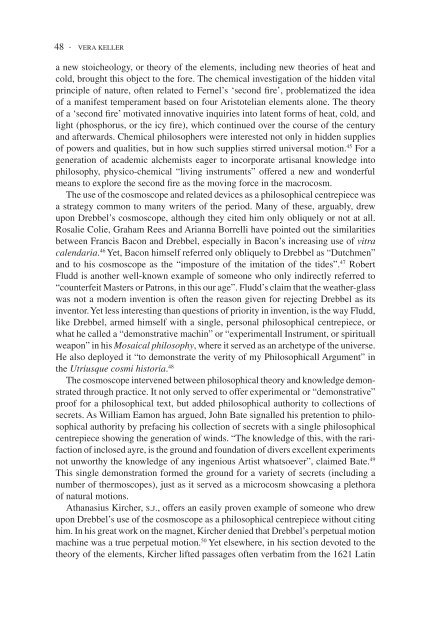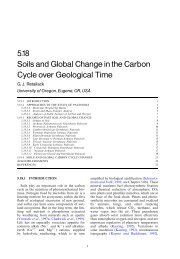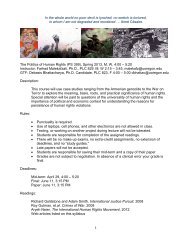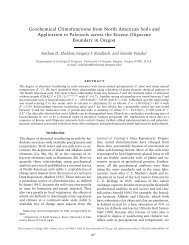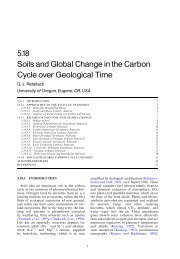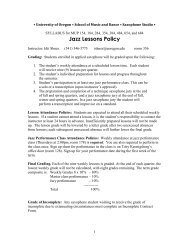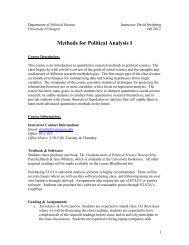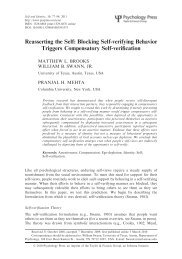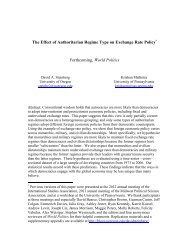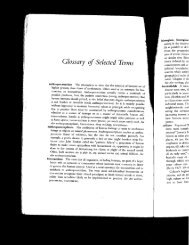drebbel's living instruments, hartmann's microcosm, and libavius's ...
drebbel's living instruments, hartmann's microcosm, and libavius's ...
drebbel's living instruments, hartmann's microcosm, and libavius's ...
You also want an ePaper? Increase the reach of your titles
YUMPU automatically turns print PDFs into web optimized ePapers that Google loves.
48 · VERA KELLERa new stoicheology, or theory of the elements, including new theories of heat <strong>and</strong>cold, brought this object to the fore. The chemical investigation of the hidden vitalprinciple of nature, often related to Fernel’s ‘second fire’, problematized the ideaof a manifest temperament based on four Aristotelian elements alone. The theoryof a ‘second fire’ motivated innovative inquiries into latent forms of heat, cold, <strong>and</strong>light (phosphorus, or the icy fire), which continued over the course of the century<strong>and</strong> afterwards. Chemical philosophers were interested not only in hidden suppliesof powers <strong>and</strong> qualities, but in how such supplies stirred universal motion. 45 For ageneration of academic alchemists eager to incorporate artisanal knowledge intophilosophy, physico-chemical “<strong>living</strong> <strong>instruments</strong>” offered a new <strong>and</strong> wonderfulmeans to explore the second fire as the moving force in the macrocosm.The use of the cosmoscope <strong>and</strong> related devices as a philosophical centrepiece wasa strategy common to many writers of the period. Many of these, arguably, drewupon Drebbel’s cosmoscope, although they cited him only obliquely or not at all.Rosalie Colie, Graham Rees <strong>and</strong> Arianna Borrelli have pointed out the similaritiesbetween Francis Bacon <strong>and</strong> Drebbel, especially in Bacon’s increasing use of vitracalendaria. 46 Yet, Bacon himself referred only obliquely to Drebbel as “Dutchmen”<strong>and</strong> to his cosmoscope as the “imposture of the imitation of the tides”. 47 RobertFludd is another well-known example of someone who only indirectly referred to“counterfeit Masters or Patrons, in this our age”. Fludd’s claim that the weather-glasswas not a modern invention is often the reason given for rejecting Drebbel as itsinventor. Yet less interesting than questions of priority in invention, is the way Fludd,like Drebbel, armed himself with a single, personal philosophical centrepiece, orwhat he called a “demonstrative machin” or “experimentall Instrument, or spirituallweapon” in his Mosaical philosophy, where it served as an archetype of the universe.He also deployed it “to demonstrate the verity of my Philosophicall Argument” inthe Utriusque cosmi historia. 48The cosmoscope intervened between philosophical theory <strong>and</strong> knowledge demonstratedthrough practice. It not only served to offer experimental or “demonstrative”proof for a philosophical text, but added philosophical authority to collections ofsecrets. As William Eamon has argued, John Bate signalled his pretention to philosophicalauthority by prefacing his collection of secrets with a single philosophicalcentrepiece showing the generation of winds. “The knowledge of this, with the rarifactionof inclosed ayre, is the ground <strong>and</strong> foundation of divers excellent experimentsnot unworthy the knowledge of any ingenious Artist whatsoever”, claimed Bate. 49This single demonstration formed the ground for a variety of secrets (including anumber of thermoscopes), just as it served as a <strong>microcosm</strong> showcasing a plethoraof natural motions.Athanasius Kircher, S.J., offers an easily proven example of someone who drewupon Drebbel’s use of the cosmoscope as a philosophical centrepiece without citinghim. In his great work on the magnet, Kircher denied that Drebbel’s perpetual motionmachine was a true perpetual motion. 50 Yet elsewhere, in his section devoted to thetheory of the elements, Kircher lifted passages often verbatim from the 1621 Latin


